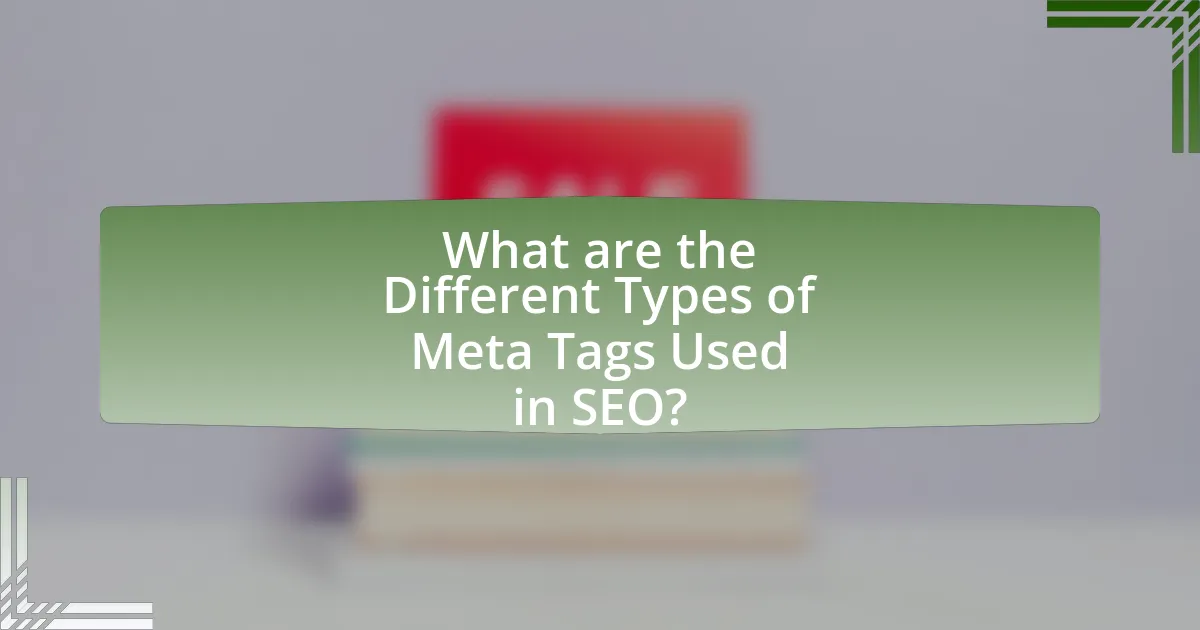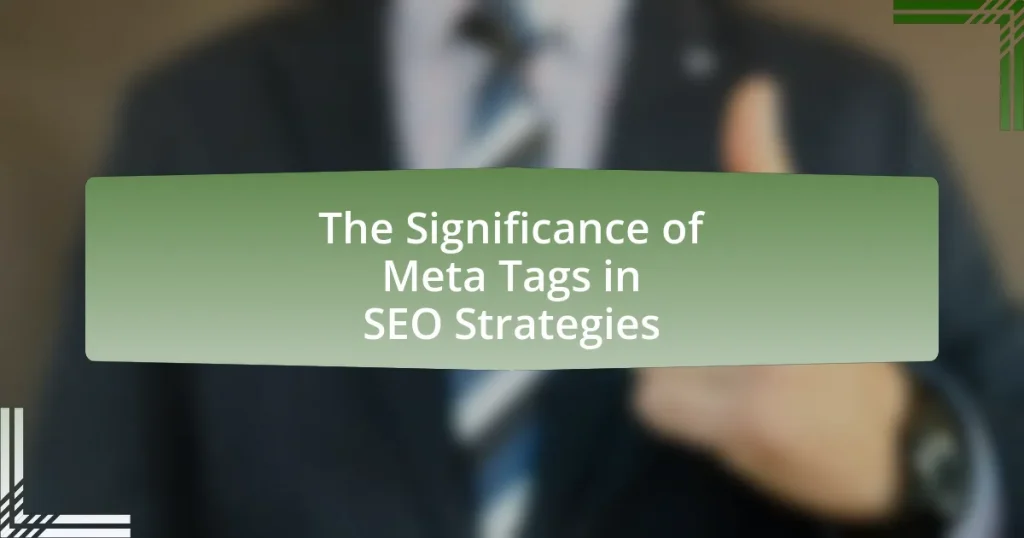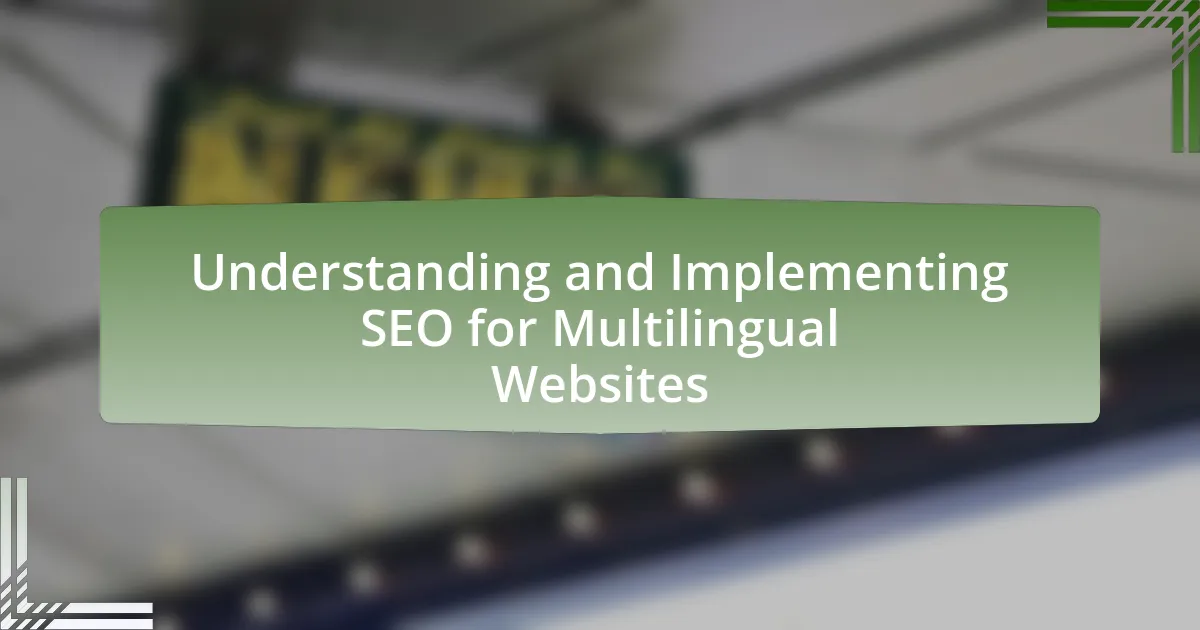Meta tags are essential HTML elements that provide structured metadata about a webpage, including the title, description, and keywords, playing a crucial role in search engine optimization (SEO). This article explores the significance of meta tags in enhancing website visibility, influencing search engine rankings, and improving click-through rates. It covers the various types of meta tags, their impact on user experience, and best practices for optimization. Additionally, the article discusses common challenges in using meta tags and strategies for continuous improvement to align with evolving SEO trends.

What are Meta Tags and Why are They Important in SEO?
Meta tags are HTML elements that provide structured metadata about a webpage, including information such as the page title, description, and keywords. They are important in SEO because they help search engines understand the content of a page, influencing how it is indexed and ranked in search results. For instance, the title tag and meta description directly impact click-through rates, as they appear in search engine results pages (SERPs). According to a study by Backlinko, pages with optimized title tags can achieve higher rankings, demonstrating the critical role of meta tags in enhancing visibility and driving organic traffic.
How do Meta Tags influence search engine rankings?
Meta tags influence search engine rankings by providing essential information about a webpage to search engines, which helps in indexing and ranking the content. Specifically, meta tags such as the title tag and meta description directly impact click-through rates; higher click-through rates can lead to improved rankings over time. Research indicates that pages with optimized meta tags tend to perform better in search results, as search engines prioritize relevant and well-structured information. For instance, a study by Moz found that title tags are a significant ranking factor, contributing to how search engines assess the relevance of a page to a user’s query.
What types of Meta Tags are most commonly used in SEO?
The most commonly used meta tags in SEO are the title tag, meta description tag, and meta robots tag. The title tag defines the title of a webpage and is crucial for search engine rankings, as it appears in search results and influences click-through rates. The meta description tag provides a brief summary of the webpage’s content, which can also impact user engagement and search visibility. The meta robots tag instructs search engines on how to index the page, allowing webmasters to control crawling and indexing behavior. These tags are essential for optimizing a website’s visibility and performance in search engine results.
How do Meta Tags affect click-through rates?
Meta tags significantly influence click-through rates (CTR) by providing concise information about a webpage’s content to search engines and users. When meta tags, such as title tags and meta descriptions, are well-crafted, they can enhance visibility in search results and entice users to click. Research indicates that compelling meta descriptions can increase CTR by up to 5.8% (source: Moz, “The Importance of Meta Tags in SEO,” 2020). This demonstrates that effective meta tags not only improve search engine rankings but also directly impact user engagement and traffic to the site.
What role do Meta Tags play in user experience?
Meta tags play a crucial role in user experience by providing essential information about a webpage to both users and search engines. They help users quickly understand the content and relevance of a page through elements like the title tag and meta description, which appear in search results. Research indicates that well-crafted meta descriptions can increase click-through rates by up to 5.8%, demonstrating their impact on user engagement. Additionally, meta tags contribute to better indexing by search engines, which enhances the visibility of a webpage, ultimately improving user satisfaction by delivering relevant search results.
How can Meta Tags improve website visibility?
Meta tags improve website visibility by providing search engines with essential information about the content of a webpage. These tags, such as title tags and meta descriptions, help search engines understand the context and relevance of the page, which can influence its ranking in search results. For instance, a well-crafted title tag can increase click-through rates by accurately summarizing the page’s content, while a compelling meta description can entice users to visit the site. According to a study by Moz, meta descriptions can significantly impact organic click-through rates, demonstrating their importance in enhancing visibility.
What is the relationship between Meta Tags and content relevance?
Meta tags play a crucial role in determining content relevance for search engines. They provide essential information about a webpage’s content, such as the title, description, and keywords, which help search engines understand the context and subject matter of the page. For instance, a well-crafted meta description can improve click-through rates by accurately summarizing the content, thereby signaling its relevance to users’ search queries. Research indicates that pages with optimized meta tags tend to rank higher in search results, as search engines prioritize content that is clearly defined and relevant to user intent.

What are the Different Types of Meta Tags Used in SEO?
Meta tags are HTML elements that provide structured metadata about a web page, and they play a crucial role in SEO. The different types of meta tags used in SEO include the title tag, which defines the title of the page and is critical for search engine rankings; the meta description tag, which summarizes the content and influences click-through rates; the meta keywords tag, which was historically used to indicate relevant keywords but is now largely obsolete; the robots meta tag, which instructs search engines on how to index the page; and the viewport meta tag, which helps with responsive design on mobile devices. Each of these tags serves specific functions that can enhance a website’s visibility and performance in search engine results.
What is the purpose of Title Tags in SEO?
Title tags serve the primary purpose of providing a concise and accurate description of a webpage’s content, which is crucial for search engine optimization (SEO). They appear as clickable headlines in search engine results and influence both click-through rates and rankings. Research indicates that title tags are a significant ranking factor, as search engines like Google use them to understand the relevance of a page to a user’s query. A well-crafted title tag can improve visibility and attract more organic traffic, making it an essential element in effective SEO strategies.
How should Title Tags be optimized for better performance?
Title tags should be optimized by ensuring they are concise, relevant, and include primary keywords. A well-structured title tag typically ranges from 50 to 60 characters to avoid truncation in search results. Including the brand name at the end can enhance recognition and click-through rates. Research indicates that title tags with targeted keywords can improve search engine rankings, as they signal to search engines the content’s relevance. According to a study by Moz, title tags are one of the top three on-page SEO factors influencing rankings, highlighting their importance in SEO strategies.
What common mistakes should be avoided with Title Tags?
Common mistakes to avoid with title tags include keyword stuffing, using generic titles, neglecting brand names, and exceeding character limits. Keyword stuffing can lead to penalties from search engines, as it compromises readability and user experience. Generic titles fail to attract clicks, as they do not convey unique value or relevance. Neglecting to include brand names can diminish brand recognition and trust, especially in competitive markets. Exceeding the recommended character limit of around 60 characters can result in truncation in search results, causing important information to be cut off. These practices can negatively impact SEO performance and user engagement.
What is the significance of Meta Descriptions?
Meta descriptions are significant because they serve as concise summaries of web pages, influencing click-through rates from search engine results. A well-crafted meta description can attract users’ attention, providing a compelling reason to visit the page. Research indicates that pages with optimized meta descriptions can experience up to a 5.8% increase in click-through rates, demonstrating their impact on user engagement and SEO performance.
How do Meta Descriptions impact user engagement?
Meta descriptions significantly impact user engagement by influencing click-through rates (CTR) on search engine results pages (SERPs). A well-crafted meta description provides a concise summary of the webpage content, enticing users to click by highlighting relevant information or benefits. Research indicates that pages with optimized meta descriptions can achieve a CTR increase of up to 5.8% compared to those without them, demonstrating their effectiveness in attracting user attention. This correlation between engaging meta descriptions and higher CTR underscores their importance in enhancing user engagement within SEO strategies.
What are best practices for writing effective Meta Descriptions?
Effective meta descriptions should be concise, ideally between 150-160 characters, and clearly summarize the content of the page. Including relevant keywords can improve visibility in search results, as search engines often highlight these terms. Additionally, crafting a compelling call-to-action encourages users to click through to the website. Research indicates that well-written meta descriptions can increase click-through rates by up to 5.8% (source: Moz). Therefore, focusing on clarity, relevance, and engagement in meta descriptions is essential for optimizing SEO strategies.

How Can Meta Tags Be Effectively Implemented in SEO Strategies?
Meta tags can be effectively implemented in SEO strategies by ensuring they are relevant, concise, and optimized for target keywords. Relevant meta tags, such as title tags and meta descriptions, should accurately reflect the content of the page while incorporating primary keywords to improve search engine visibility. For instance, a study by Moz indicates that well-crafted title tags can significantly influence click-through rates, as they appear prominently in search results. Additionally, keeping meta descriptions under 160 characters ensures they are fully displayed in search results, enhancing user engagement. By regularly updating and testing these tags based on performance metrics, businesses can refine their SEO strategies and improve organic search rankings.
What tools can assist in optimizing Meta Tags?
Tools that can assist in optimizing Meta Tags include Yoast SEO, SEMrush, Moz, and Ahrefs. Yoast SEO is a popular WordPress plugin that provides real-time analysis of Meta Tags, ensuring they meet SEO best practices. SEMrush offers a comprehensive suite for keyword research and on-page SEO analysis, including Meta Tag optimization features. Moz provides tools for tracking Meta Tag performance and suggestions for improvements based on search engine algorithms. Ahrefs includes a site audit tool that evaluates Meta Tags and provides actionable insights for optimization. These tools are widely recognized in the SEO community for their effectiveness in enhancing Meta Tag performance, thereby improving search engine visibility.
How can SEO audits help in assessing Meta Tag effectiveness?
SEO audits can help in assessing Meta Tag effectiveness by systematically evaluating the relevance, optimization, and performance of these tags in search engine results. Through an SEO audit, specific metrics such as click-through rates (CTR), keyword relevance, and compliance with best practices can be analyzed. For instance, a study by Moz indicates that well-optimized Meta Tags can improve CTR by up to 36%. By identifying underperforming tags and comparing them against industry benchmarks, SEO audits provide actionable insights that can enhance Meta Tag strategies, ultimately leading to improved search visibility and user engagement.
What metrics should be monitored to evaluate Meta Tag performance?
To evaluate Meta Tag performance, key metrics to monitor include click-through rate (CTR), organic search rankings, and impressions. CTR indicates the percentage of users who click on a link after seeing the Meta Tag in search results, reflecting its effectiveness in attracting traffic. Organic search rankings show the position of a webpage in search engine results, which can be influenced by well-optimized Meta Tags. Impressions measure how often a webpage appears in search results, providing insight into visibility and potential reach. Monitoring these metrics allows for assessing the impact of Meta Tags on overall SEO performance.
What are common challenges in using Meta Tags for SEO?
Common challenges in using meta tags for SEO include ensuring relevance, avoiding duplication, and managing character limits. Relevance is crucial because search engines prioritize content that accurately reflects the page’s subject; irrelevant meta tags can lead to lower rankings. Duplication occurs when multiple pages use the same meta tags, which can confuse search engines and dilute page authority. Character limits, typically around 150-160 characters for meta descriptions, require concise and impactful messaging, making it difficult to convey essential information effectively. These challenges can hinder a website’s visibility and performance in search engine results.
How can website owners troubleshoot Meta Tag issues?
Website owners can troubleshoot Meta Tag issues by validating their Meta Tags using tools like Google’s Structured Data Testing Tool and checking for errors in the HTML code. These tools help identify problems such as missing or incorrectly formatted tags, which can negatively impact SEO performance. Additionally, website owners should ensure that their Meta Tags are not duplicated across pages, as unique tags are essential for effective indexing by search engines. Regularly reviewing the website’s source code and using browser extensions can also assist in identifying discrepancies in Meta Tag implementation.
What are the implications of outdated Meta Tags on SEO?
Outdated meta tags negatively impact SEO by reducing a website’s visibility and relevance in search engine results. Search engines rely on meta tags, such as title tags and meta descriptions, to understand the content and context of web pages. When these tags are outdated, they may not accurately reflect the current content, leading to lower click-through rates and diminished user engagement. According to a study by Moz, 70% of search engine users are influenced by the title tag and meta description when deciding to click on a link. Therefore, maintaining updated meta tags is crucial for optimizing search engine rankings and attracting organic traffic.
What are the best practices for using Meta Tags in SEO?
The best practices for using Meta Tags in SEO include ensuring that title tags are concise, relevant, and contain primary keywords, as they significantly influence search engine rankings. Additionally, Meta descriptions should be compelling and summarize the page content effectively, ideally incorporating target keywords to improve click-through rates. It is also essential to avoid duplicate Meta tags across different pages, as this can confuse search engines and dilute ranking potential. Research indicates that pages with unique and optimized Meta tags can achieve higher visibility in search results, enhancing overall SEO performance.
How can continuous optimization of Meta Tags enhance SEO results?
Continuous optimization of Meta Tags enhances SEO results by improving search engine visibility and click-through rates. Meta Tags, including title tags and meta descriptions, directly influence how search engines interpret page content and how users perceive search results. For instance, a well-optimized title tag that includes relevant keywords can lead to higher rankings in search results, as search engines prioritize pages that closely match user queries. Additionally, compelling meta descriptions can entice users to click on a link, increasing organic traffic. According to a study by Backlinko, pages with optimized title tags can achieve up to a 20% increase in click-through rates, demonstrating the tangible benefits of continuous optimization.
What strategies can be employed to stay updated with Meta Tag trends?
To stay updated with Meta Tag trends, regularly follow industry-leading SEO blogs and forums. Websites like Moz, Search Engine Journal, and Google’s Webmaster Blog frequently publish insights and updates on SEO practices, including Meta Tags. Additionally, subscribing to newsletters from these sources ensures timely information delivery. Engaging in online communities, such as Reddit’s SEO subreddit or LinkedIn groups focused on digital marketing, allows for real-time discussions and shared experiences regarding Meta Tag developments. Attending webinars and conferences, such as SMX or Pubcon, provides opportunities to learn from experts and network with peers, further enhancing knowledge on current trends.




